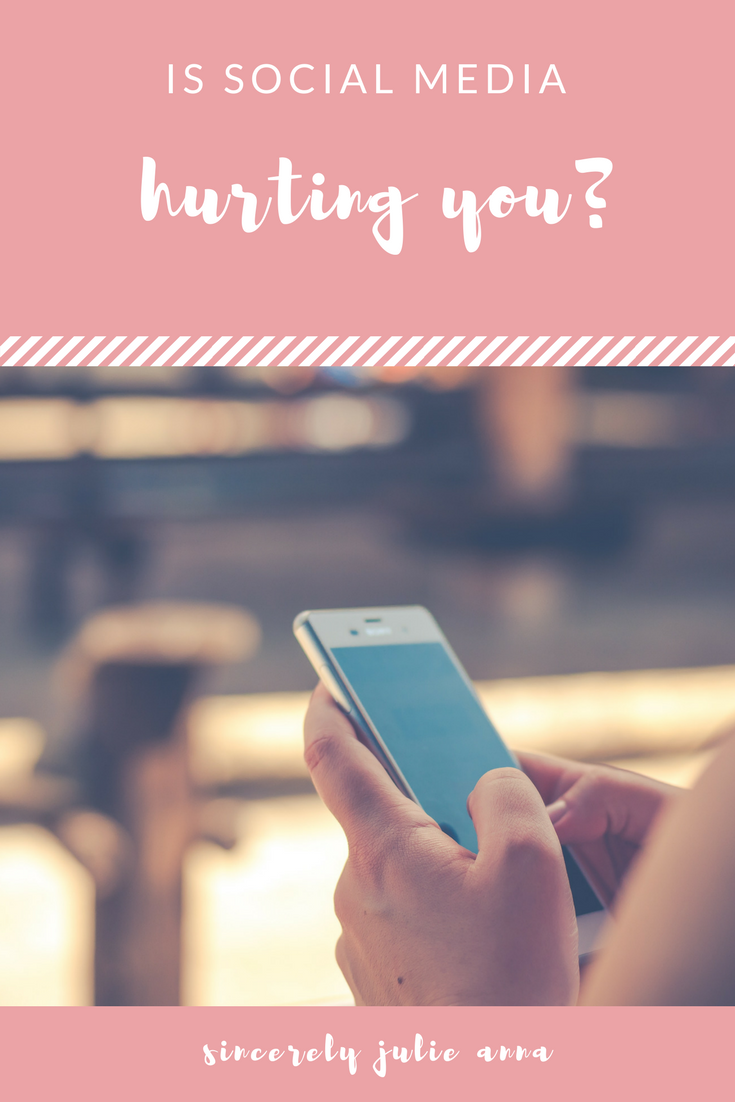Social Media is all around us. And if you’re my age, you’ve been raised in the age of the internet. You’ve been introduced to this concept along with everyone else. You’ve also been discovering the good and the bad as you’ve grown up. But many times, the bad outweighs the good. We fall into unproductive habits, the comparison trap, and develop unhealthy motivations and feelings. It’s important to assess when this occurs so we can take a break and realize the effects social media has on us. Here’s how to know if social media is hurting you, and when to limit your time on your preferred accounts.
You’re constantly scrolling.
It’s so easy to let the internet pass time. But do you know how much time you’re letting go? If not, that’s completely understandable, as we don’t exactly block off ten minutes a day to check our socials. In fact, given the infinite scroll layout of many social media sites, it would be difficult to stop! Despite this, you should be aware of how much time you spend on your socials, and figuring that out is easy. If you’re on iOS, go to settings -> battery. And if you’re on Android, apps like Frequency can accomplish the same task.
Now that you can see a breakdown of how much time you spend on apps, think about how that compares to the number of hours you have in a day. Maybe you do want to keep up with your friends, but spending two hours a day doing so can be cut down.
Additionally, we may consider the source of our scrolling to be boredom. If you’re looking to stop the habit of turning to technology whenever you have a spare moment, let this be a reminder of how much time you spend scrolling. This can be the start of telling yourself to find something else to do, whether that’s another hobby or getting something productive done.
You post just to prove you have an interesting life.
Have you ever heard someone say something to the effect of this? When you’re out with friends, and someone says, “Gotta post so people know I have a life!”. Usually, it’s a half-mockery of what we’ve all become. But it’s true. Many of us feel the need to post every time we go out. We need to show everyone that we’re having fun all the time. We develop this mindset that people will think we don’t have a life if we don’t post.
But what happens if we don’t have the opportunity to post? What if the venue is too dark? What if our phone dies?
If you feel any regret for not being able to post something when you go out, I want you to consider why you feel that way. Do you feel that people will think lowly of you and your social life? Who are these people that you want to prove a point to? And how much will this matter in the end? Although this mindset is very common, we all have our reasons. Take a break and answer these questions in order to understand your motivations.
You fall into the comparison trap.
Social media is always the highlight reel. Even on a platform like Snapchat, where stories are intended to be in the moment, many people aim for aesthetic. We tend to want to post good things. We’re not going to post on Instagram that we burnt our food, we’re going to post the second try that looks good. Once I posted a picture of the apples and pumpkins I picked on a farm – little did everyone know it was pouring rain. Granted, I still had fun, but it’s not the picture-perfect autumn moment that you’d hope for.
If you’re scrolling and you realize that other people’s lives are getting to you, even if most of them are staged, it’s time to take a break. Now more than ever we know way more about random people’s lives than our own. And when we compare our lives to others, we forget about all the things that are wonderful about our own.
Your social media consumption affects your view of the people in your life.
Sometime in college, I was talking to someone about one of our classmates and a big project he was putting together. Somehow the conversation trailed into my most recent Snapchat story, who that classmate was on. And when she brought up Snapchat, she said nastily, “Yeah, well it looks like you’re always having fun.”
The story in question? A study session where the classmate successfully threw a wad of paper into the recycling bin across the room. Not a party. Not a trip to Europe (or anywhere). Just a study session. And that was essentially all I posted to my story then, just study sessions.
I explained to her that all I was posting was study shenanigans. In fact, senior year, study sessions were really the only time that I saw my friends because that semester I was taking seven classes and working a lot. I didn’t have any money to spend either, so even if I did have the time I wouldn’t have been out and about. I think that made her realize for the moment that she had conjured a false representation of my life. But her comment really made me feel bad, too. I didn’t want to make anyone feel bad for what I was posting and started overthinking what I posted, which, in hindsight, I realize wasn’t healthy either.
Once again, this situation is more common than you think. Someone probably thinks that you’ve got a perfect life. And you probably think someone else has a pretty great life, too. But if this is affecting your relationship with them in real life, take a step back. We’ve all got vastly different lives, and that makes comparing a difficult task, but we do it all the time.
You rely on instant gratification.
Likes, views, screenshots, retweets, comments. These are all little things that can carry a lot of weight if we let them. We get a little boost when someone likes our selfie, or when we get more comments on a post than usual. But we shouldn’t rely on these things. We shouldn’t use our follower or friend count to determine our value as a person. Instead, we should figure out what our value is. What makes us unique? It’s not your average number of likes.
I also want to make a point about especially paying close attention to the number of followers or friends you have. If this ever gets you down, I want you to remember two things. One, that the number of “friends” you have does not represent the number of friends you have in real life, nor does it represent a linear equation of how many friends you have in real life. And two, that even if you have fewer friends in real life, that it is just as admirable to have few very close friends as it is to have many friends. Don’t let your friend count or view count make you forget that.
I hope that this post helped you gain insight into your social media habits. Remember that it is always okay to take breaks for as long as you need to and that there are plenty of good ways to stay in contact with your loved ones. Let me know below what your thoughts are on social media. Did you check out how much time you spent on your socials? Were you surprised by your numbers? I was shocked too, even for only having one or two accounts at a time. Once I learned though, I was able to be more conscious of that time, and if you’re looking to cut down your time on social media too, I hope this helps you.
Sincerely,
Julie Anna





